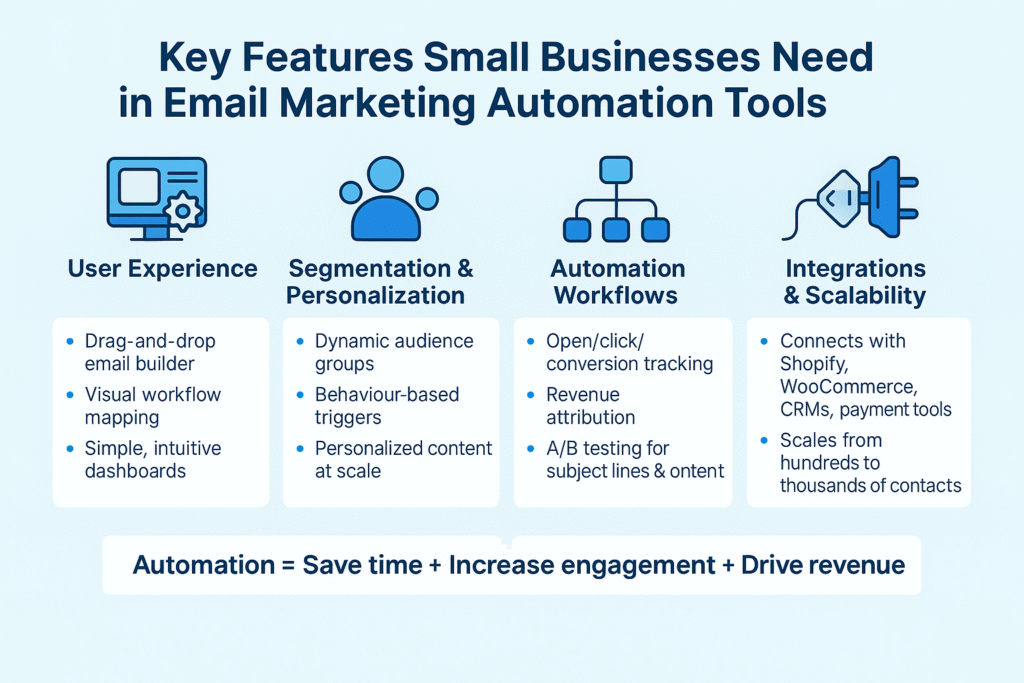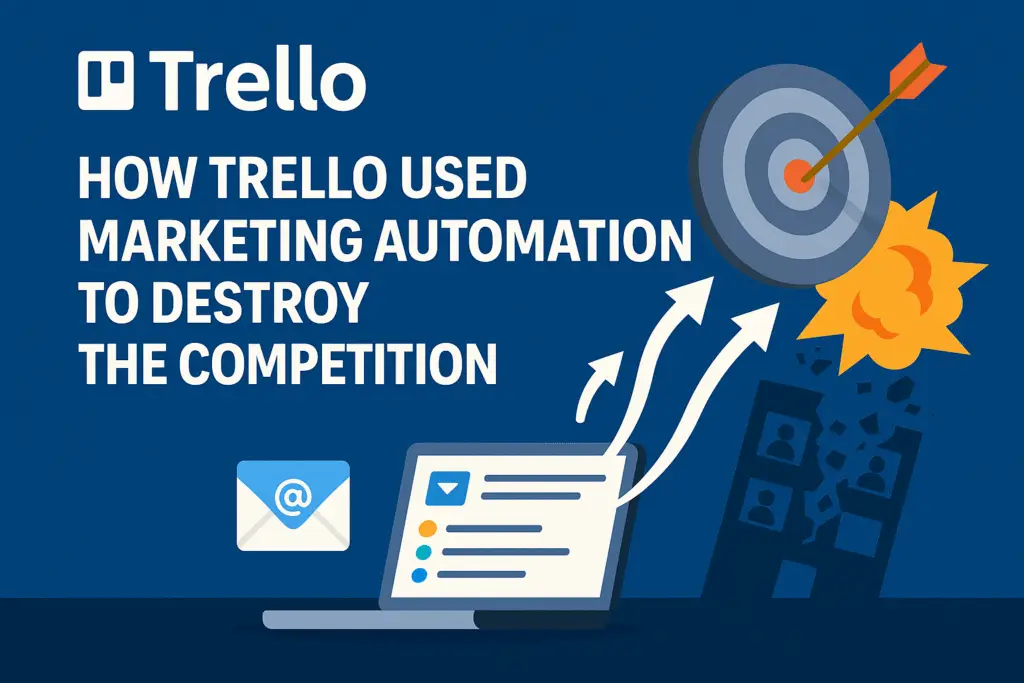
Email marketing automation has become a great tool for small businesses. It allows you to send targeted, personalized messages to your customers at precisely the right moments without manually hitting send every time. Whether you’re welcoming new subscribers, nurturing leads, or re-engaging dormant customers, email marketing automation tools handle these tasks seamlessly while you focus on growing your business.
The impact on small businesses is remarkable. You can transform one-time buyers into loyal customers, recover abandoned shopping carts, and maintain consistent communication that drives revenue growth. These tools eliminate the time-consuming manual work of digital marketing while delivering messages that feel personal and relevant to each recipient.
Choosing the right platform can feel overwhelming with so many options available. In this article, we will explore the top 10 email marketing automation tools for small businesses, highlighting their key features and benefits to help you choose the right one for your business. You’ll discover which platforms offer the best value, easiest setup, and most powerful features for your specific needs.
Why Small Businesses Need Email Marketing Automation

Running a small business means juggling countless tasks daily, and email marketing shouldn’t consume hours of your precious time. Email automation transforms this challenge into an opportunity, allowing you to maintain consistent communication with customers while focusing on core business activities.
Time-Saving Automation Benefits
Manual email campaigns can take up a lot fo time and resources – from crafting individual messages to managing subscriber lists. Automation can help you handle these repetitive tasks:
- Automated sending schedules ensure your messages reach customers at optimal times
- Smart segmentation automatically groups subscribers based on behavior and preferences
- Trigger-based responses activate when customers take specific actions
Enhanced Customer Engagement & Retention
Your customers expect personalized experiences that feel genuine and automation can help you deliver targeted content based on customer behavior, purchase history, and engagement patterns. This personalized approach builds stronger relationships and keeps your brand top-of-mind when customers are ready to buy.
Revenue Growth Through Strategic Targeting
Targeted campaigns significantly outperform broadcast emails in conversion rates. Automation enables you to send the right message to the right person at the perfect moment – whether it’s a welcome series for new subscribers or a re-engagement campaign for inactive customers.
Scalable Growth Support
As your subscriber list grows from hundreds to thousands, automation scales effortlessly with your business. You can nurture leads, onboard new customers, and maintain relationships without proportionally increasing your workload or team size.
Key Features to Look for in Email Marketing Automation Tools
Selecting the right email automation features can make or break your marketing success. Your chosen platform should simplify complex tasks while delivering powerful results and ideally have small business AI tools built into it.
User Experience and Interface Design
A clean, intuitive dashboard saves you countless hours of frustration. Look for platforms with drag-and-drop editors that let you create professional emails without coding knowledge. The best tools offer visual workflow builders where you can map customer journeys with simple clicks and connections.
Advanced Segmentation Capabilities
List segmentation transforms generic broadcasts into personalized conversations. Your tool should allow you to segment contacts based on demographics, purchase history, engagement levels, and behavioral triggers. Dynamic segmentation automatically updates lists as subscriber data changes, ensuring your messages always reach the right audience.
Comprehensive Automation Workflows
Robust marketing automation goes beyond basic autoresponders. Seek platforms offering:
- Drip campaigns for nurturing leads over time
- Welcome series for new subscribers
- Abandoned cart recovery sequences
- Re-engagement campaigns for inactive contacts
- Birthday and anniversary triggers
Data-Driven Optimization Tools
Powerful analytics reveal what resonates with your audience. Essential reporting features include open rates, click-through rates, conversion tracking, and revenue attribution. A/B testing capabilities let you experiment with subject lines, send times, and content variations to maximize performance.
Seamless Integration Ecosystem
Your email tool should connect effortlessly with your existing tech stack. Priority integrations include eCommerce platforms like Shopify and WooCommerce, CRM systems, social media channels, and payment processors. These connections create unified customer experiences across all touchpoints.
1. Constant Contact
Constant Contact is one of the easiest email marketing automation tools for small businesses to use, especially for entrepreneurs who want a simple solution without losing important features. This platform has built its reputation on delivering professional results through an intuitive approach that doesn’t overwhelm newcomers to email marketing.
Key Features:
- Beginner-friendly interface with drag-and-drop email builder
- Event management capabilities including RSVP tracking and ticket sales
- Advanced list segmentation based on demographics, behavior, and engagement
- A/B testing options for subject lines, content, and send times
- Seamless integrations with Shopify, WooCommerce, and 300+ other platforms
- AI-powered content suggestions and social media advertising tools
Pros:
- Exceptional customer support with live chat, phone, and email assistance
- Comprehensive template library with mobile-responsive designs
- Built-in survey and poll creation tools
- Strong deliverability rates and compliance features
Cons:
- Limited automation workflows compared to advanced competitors
- Higher pricing for larger subscriber lists
- Basic reporting capabilities for detailed analytics needs
Pricing Structure:
Constant Contact offers transparent pricing starting at $12/month for up to 500 contacts, with plans scaling based on your subscriber count. New users can explore all features through a 14-day free trial without requiring credit card information, making it risk-free to test the platform’s capabilities for your specific business requirements.
2. Brevo (formerly Sendinblue)
Brevo combines affordability with comprehensive multi-channel marketing capabilities. This platform transforms how small businesses approach customer communication by extending beyond traditional email marketing into SMS and WhatsApp campaigns.
Key Features:
- Budget-friendly pricing structure with generous free plan options
- Multi-channel marketing including email, SMS, and WhatsApp campaigns
- Intuitive drag-and-drop editor for creating professional emails without coding
- Built-in landing page builder for capturing leads effectively
- Facebook ads integration for seamless social media marketing
- Behavior-based segmentation for targeted messaging
- Automation workflows triggered by customer actions
Pros:
- Excellent value for money with robust free tier
- User-friendly interface perfect for beginners
- Strong deliverability rates ensuring emails reach inboxes
- Comprehensive customer support including live chat
Cons:
- Limited template customization options compared to premium competitors
- Advanced automation features require higher-tier plans
- Reporting dashboard could be more detailed for data-driven marketers
Pricing:
Brevo offers a free plan supporting up to 300 emails daily with basic features. Paid plans start at $9/month for the Starter plan, making it one of the most accessible email marketing automation tools For Small Businesses in today’s market.
3. Mailchimp
Perhaps the most widely known email marketing tool, Mailchimp has transformed from a simple email service into a comprehensive all-in-one marketing platform. This evolution makes it particularly attractive for small business owners seeking to consolidate their digital marketing efforts under one roof.
Key Features:
- All-in-One Marketing Platform: Beyond email campaigns, Mailchimp offers website building, social media advertising, and customer journey mapping
- Pre-Built Automation Journeys: Ready-to-use workflows including welcome series, abandoned cart recovery, and customer re-engagement campaigns
- Advanced Contact Management: Sophisticated segmentation through groups, tags, and behavioral triggers for precise audience targeting
- Drag-and-Drop Email Builder: User-friendly interface with customizable templates and mobile-responsive designs
- Cross-Channel Integration: Seamless connection with Facebook, Instagram, Google Ads, and major eCommerce platforms
Pros:
- Extensive template library with professional designs
- Robust analytics and reporting capabilities
- Strong deliverability rates and reputation management
- Comprehensive learning resources and tutorials
Cons:
- Pricing can escalate quickly as subscriber lists grow
- Limited phone support on lower-tier plans
- Some advanced features require higher-priced subscriptions
Pricing:
Mailchimp offers a free plan supporting up to 500 contacts with basic features. Paid plans start at $13/month for the Essentials plan, scaling to $350/month for Premium features, making it accessible for various business sizes and budgets.
4. MailerLite
MailerLite prioritizes simplicity without sacrificing functionality. This platform caters specifically to entrepreneurs and small business owners who need powerful email marketing capabilities without the complexity that often comes with enterprise-level platforms.
Key Features:
- Free tier generosity: Supports up to 1,000 subscribers with 12,000 monthly emails at no cost
- Drag-and-drop automation builder: Creates personalized customer journeys with visual workflow design
- Interactive content blocks: Enhances email engagement with polls, surveys, and clickable elements
- Landing page builder: Includes customizable templates for lead capture
- Stripe integration: Enables direct digital product sales through email campaigns
- A/B testing capabilities: Optimizes subject lines, content, and send times
Pros:
- Exceptionally user-friendly interface ideal for beginners
- Competitive pricing structure that scales with business growth
- Reliable email deliverability rates
- Responsive customer support via live chat
Cons:
- Limited advanced segmentation options compared to premium alternatives
- Fewer third-party integrations than platforms like Constant Contact
- Basic reporting features may not satisfy data-driven marketers
Pricing Structure:
MailerLite’s pricing begins at $10 monthly for up to 1,000 subscribers, with costs scaling based on list size. The generous free plan makes it particularly attractive for startups testing Email Marketing Automation Tools For Small Businesses before committing to paid solutions.
5. Moosend
Moosend stands out among the top email marketing automation tools for small businesses with its powerful combination of affordability and advanced features. This platform empowers you to create sophisticated email campaigns without breaking your budget, making it an excellent choice for growing businesses seeking professional-grade capabilities.
Key Features of Moosend:
- AI-driven recommendation engine: Analyzes customer behavior patterns and automatically suggests the most relevant products to each subscriber, dramatically increasing click-through rates and sales potential.
- Advanced analytics capabilities: Gain deep insights into your audience demographics and purchase tracking data. Monitor customer journeys from initial engagement through final purchase, enabling data-driven decisions that optimize your marketing strategy.
- Visual workflow builder: Transform complex automation sequences into intuitive, drag-and-drop experiences.
- Extensive template library: Access over 100 professionally designed email templates to create visually appealing campaigns.
- Integration options: Connect seamlessly with popular eCommerce platforms.
Moosend’s comprehensive reporting dashboard reveals which campaigns resonate most with your audience, helping you refine your messaging and improve overall performance. The platform also includes spam testing tools and real-time performance monitoring to ensure deliverability and engagement rates remain high.
With its robust feature set at an affordable price point, Moosend is a top choice for small businesses looking to leverage the power of email marketing automation.
6. HubSpot
HubSpot’s email marketing tools for small business stand out by offering a platform that seamlessly integrates customer relationship management with email marketing capabilities. This all-in-one solution eliminates the need for multiple tools, making it an attractive choice for businesses seeking streamlined operations.
Key Features include:
- Drag-and-drop email builder with intuitive design capabilities
- Smart personalization tokens that automatically insert subscriber-specific information
- Behavioral triggers based on website activity and CRM data
- Advanced segmentation using CRM properties and customer lifecycle stages
- A/B testing for subject lines, content, and send times
- Detailed analytics showing email performance alongside sales attribution
The platform’s subscriber data personalization options leverage your CRM database to create dynamic content blocks that adapt based on contact properties, previous purchases, or engagement history. HubSpot’s automation workflows can trigger based on form submissions, page visits, deal stages, or custom events.
7. Omnisend
Omnisend is a specialized platform built specifically for eCommerce operations. This solution transforms how online retailers connect with their customers through sophisticated omnichannel marketing capabilities.
Key eCommerce-focused features include:
- Pre-built automation workflows for online stores (welcome series, abandoned cart recovery, post-purchase follow-ups)
- Product recommendation engine that dynamically inserts relevant items based on browsing behavior and purchase history
- Advanced segmentation tools that categorize customers by purchase patterns, engagement levels, and shopping preferences
- Revenue tracking that directly attributes sales to campaigns
Omnisend integrates deeply with Shopify, WooCommerce, and BigCommerce. It includes eCommerce-specific templates featuring product blocks, discount codes, and review collection elements. Behavior-triggered campaigns automatically respond to customer actions, sending targeted messages when shoppers abandon carts or reach purchase milestones.
8. GetResponse
GetResponse combines powerful automation capabilities with sales funnel creation tools. This makes it an excellent choice for businesses ready to scale their marketing efforts beyond basic email campaigns.
Key Features That Set GetResponse Apart:
- Advanced Sales Funnel Automation – guide prospects from initial contact through conversion
- Built-in A/B Testing – optimize subject lines, content, and send times
- Landing Page Builder – create high-converting pages that integrate with email campaigns
- Webinar Integration – host webinars directly through the platform
- Contact Scoring – automatically score leads based on engagement and behavior
GetResponse excels at bridging the gap between email marketing and sales, offering tools that help nurture leads through complex buying cycles. Pricing scales with your needs, starting at competitive rates for small businesses.
9. AWeber
AWeber is one of the best email marketing automation tools for small businesses. It focuses on simplicity and excellent customer support, with over 20 years of experience helping business owners succeed.
Key Features That Set AWeber Apart:
- Drag-and-Drop Editor – create professional-looking emails without coding
- Landing Page Builder – customizable templates for lead capture or product sales
- Responsive Customer Support – live chat, phone, and email
- Rich Analytics Dashboard – track open rates, clicks, and subscriber growth
- Automation Workflows – welcome series, follow-up campaigns, and behavioral triggers
AWeber balances functionality with ease of use. It integrates with WordPress, Shopify, and PayPal, making it an excellent choice for small businesses seeking reliable automation.
10. Drip
Drip is a sophisticated platform focused on eCommerce, created to help businesses grow their revenue by engaging with customers intelligently. It’s specifically designed for online retailers who require advanced tracking of customer behavior and the ability to personalize their marketing.
Key Features:
- Advanced eCommerce Integration: Seamless connectivity with WooCommerce, Shopify, and other major platforms enables real-time data synchronization
- Behavioral Segmentation: Create highly targeted customer segments based on purchase history, browsing patterns, and engagement levels
- Revenue Attribution Tracking: Monitor which campaigns directly contribute to sales across multiple channels
- Visual Workflow Builder: Design complex automation sequences using an intuitive drag-and-drop interface
- Personalized Product Recommendations: Leverage customer data to suggest relevant products automatically
Pricing Structure:
Drip’s pricing begins at $39 per month for up to 2,500 contacts, positioning it as a premium solution without a permanent free plan. The investment reflects its advanced feature set and eCommerce specialization.
Best For:
Growing online businesses that require sophisticated automation beyond basic email campaigns. Drip excels when you need detailed customer journey mapping and want to maximize revenue from existing subscribers through data-driven personalization strategies.
Conclusion
there’s no doubt that email marketing automation has become an essential tool for small businesses looking to grow while staying connected with customers. From simple, beginner-friendly platforms to advanced solutions tailored for eCommerce, the right software can save time, boost engagement, and increase sales without overwhelming your team. By weighing ease of use, pricing, and features against your specific goals, you can select a tool that not only fits your budget but also supports sustainable long-term growth.
As technology continues to evolve, automation will only become more powerful and accessible. Understanding automation and how it works will be critical in the next era of the internet and larger digital ecosystem. The key is to start small, experiment with different approaches, and build on what works for your audience. By treating email automation as an ongoing strategy rather than a one-off setup, you’ll create a flexible system that adapts as your business and customers grow.
Email Marketing Automation FAQs
1. What is email marketing automation?
Email marketing automation is the use of software to send targeted, personalized messages automatically based on customer actions, schedules, or conditions.
2. Why is email marketing automation important for small businesses?
It allows small businesses to maintain consistent customer communication, save time, increase engagement, and drive more sales without needing large marketing teams.
3. Are email automation tools expensive?
No, many platforms offer affordable plans or free tiers. Options like MailerLite and Brevo start under $15 per month, making automation accessible for startups and small businesses.
4. What features should I look for in an email marketing automation tool?
Key features include automated workflows, segmentation, analytics, A/B testing, and integrations with your eCommerce or CRM systems.
5. Can email automation really improve sales?
Yes. Automated campaigns such as abandoned cart reminders, affiliate marketing automation, personalized product recommendations, and welcome series typically convert better than one-off bulk emails.
6. Which email marketing automation tool is best for beginners?
Constant Contact, MailerLite, and Brevo are popular beginner-friendly options thanks to their simple interfaces, affordable pricing, and helpful support resources.


